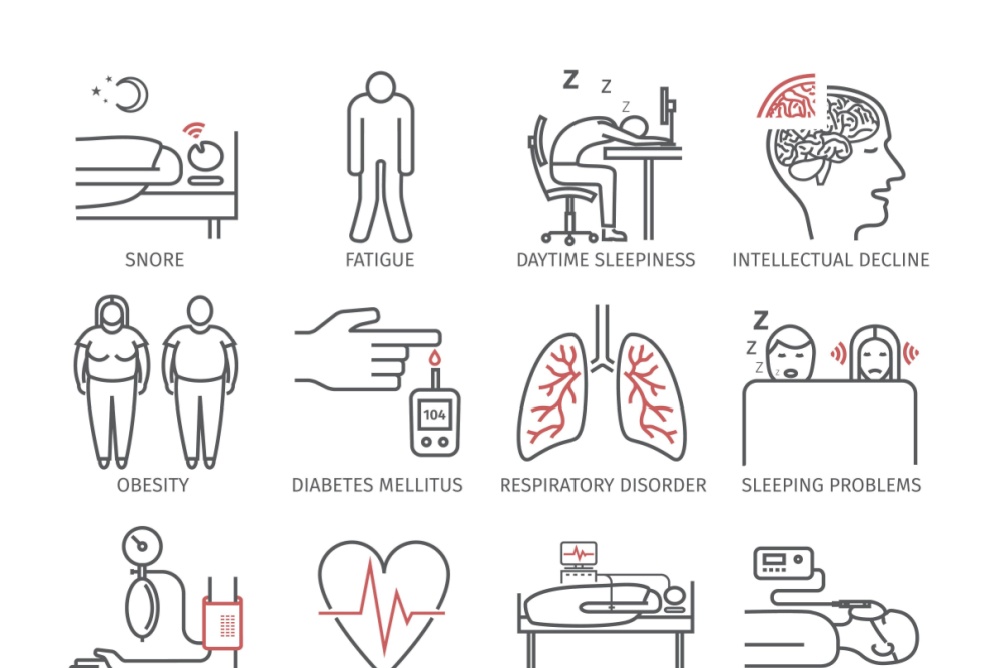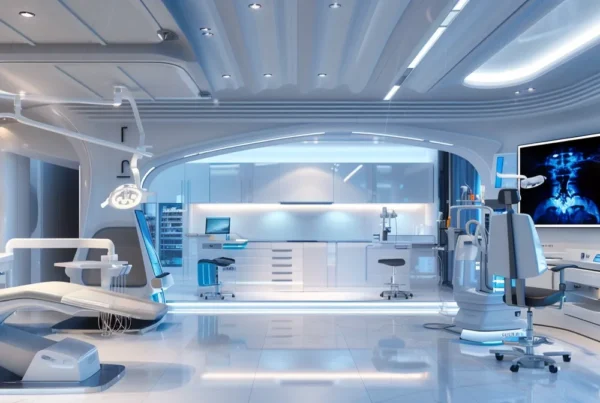Sleep apnea symptoms & signs can be difficult to see, for most people to see. Have you ever feel like you’re in a fog each morning? Relying on endless cups of coffee just to stay awake? Or collapsing into bed and instantly falling asleep every evening? You might chalk it up to just being run-down or aging. Yet, these could be clues pointing to a deeper issue—specifically, adult sleep apnea.
Sleep apnea quietly disrupts your sleep, causing your breathing to stop and start repeatedly throughout the night. This happens without you remembering it on your end, potentially stirring you awake hundreds of times. The result? You’re left feeling wiped out, struggling to make it through your day. If left unchecked, sleep apnea can deeply impact your health, contributing to a range of serious conditions.
It’s a sneaky thief of rest, and many don’t even realize they’re its victim. But recognizing these symptoms is the first step toward reclaiming your energy and health. Dr. Eugene Azuma at Azuma Dental in Honolulu, HI, understands the big impact sleep apnea can have on your life and well-being. As Honolulu’s top dentists in airway related issues, he can help you sleep better!
The Signs & Symptoms of Adult Sleep Apnea
Feeling Too Tired During the Day?
Ever struggle to keep your eyes open during the day, even if you slept all night? Do you start dozing off while reading, watching TV, or driving? This kind of tiredness during the day is a big hint that you might have sleep apnea.
With sleep apnea, your sleep gets interrupted a lot because you stop breathing briefly. So, you’re really not resting well. This makes you feel super tired and sleepy, no matter how long you were in bed.
If you’re turning to naps, coffee, or energy drinks just to make it through your day, that’s a warning sign. There’s a simple test called the Epworth Sleepiness Scale that can help figure out how sleepy you are. Fill it out and show it to your doctor.
Headaches When You Wake Up?
Do headaches greet you in the morning, even after a long sleep? Or maybe you feel really out of it, like your brain just won’t clear up. These could be sleep apnea symptoms pointing to sleep apnea.
Every time you’re breathing stops at night, even briefly, your brain gets less oxygen. This lack of oxygen messes with your blood flow, which can lead to headaches first thing in the morning. It can also make you feel fuzzy and out of sorts—like you’re in a fog.
Take a moment to notice how you’re feeling each morning. Consistent headaches after sleeping could be a nudge to check for sleep apnea.
Feeling Grumpy or Moody?
Not feeling like yourself lately? More snappy or anxious? This could be sleep deprivation at play—a side effect of sleep apnea.
When you don’t sleep well, like with sleep apnea, it disrupts the normal sleep stages your brain needs. You don’t get to recharge properly. Also, when your oxygen dips during sleep, it can actually change your brain chemistry. This can make you feel more irritable or down.
If you’re often feeling cranky, lonely, or just sad without any obvious reason, it might be sleep apnea symessing with your emotions. It’s worth talking about these mood changes with your doctor to figure out why it’s happening.
Frequent Nighttime Urination and Nocturia
Going to the bathroom a lot at night might be more than just a sign of aging. It could hint at sleep apnea.
Sleep apnea lowers your oxygen levels, which in turn can make your body release certain chemicals. These chemicals make you pee more. And when your sleep’s not deep, you’ll notice the urge to go even more.
If you’re up several times a night for bathroom breaks, keep a count. Share these numbers with your doctor. It could help spot sleep apnea.
Impotence or Decreased Libido
If you’re over 40 and facing new issues with sexual performance, it might not just be age. It could be a sign of a sleep issue like sleep apnea.
A lot of men with erectile dysfunction—more than 9 out of 10—also struggle with sleep apnea. The thing is, when your sleep is broken, and you’re not getting enough oxygen, it messes with your hormones. And that can make sexual performance tough.
Seeing a big change in your sex drive or function? Talk to your doctor. Being honest about what’s going on can help pinpoint if sleep troubles are to blame.
Dry Mouth and Sore Throat?
Ever wake up with your mouth feeling like sandpaper? Or your throat so sore it hurts to swallow? These might be signs of sleep apnea. When your airway is blocked at night, you might end up sleeping with your mouth wide open. This dries out your mouth and throat big time.
Snoring a lot and struggling to breathe at night can also overwork your throat muscles. That’s why you might wake up with a throat that feels sore and scratchy.
Notice your throat feels worse when you get up in the morning? Mention this to your doctor. It could point to a hidden problem with your breathing when you’re asleep.
Night Sweats
Find yourself waking up drenched, even when it’s not that hot? This could be your body flagging down sleep apnea. When you can’t breathe right at night, your body gets stressed and releases adrenaline. That’s what can cause you to sweat a lot in your sleep.
This stress response can mess with how your body controls its temperature. So, you end up with night sweats. Keep track if you’re sweating a lot at night. It’s a less obvious sign of sleep apnea that’s good to talk over with a doctor.
High Blood Pressure
Research links sleep apnea with a higher chance of high blood pressure. Why? Because every time you stop breathing at night, your blood oxygen falls and your blood pressure spikes.
This isn’t just a one-time thing. It keeps happening all night, putting a strain on your heart and blood vessels. It can lead to long-term high blood pressure, which ups your risk for heart issues and stroke.
If your blood pressure’s high and won’t budge with meds or changes in your habits, talk to your doctor. Getting checked for sleep apnea might be the next step. Getting it treated could also help get your blood pressure back on track.
Gasping or Choking While Sleeping
Ever wake up gasping or choking? It’s scary, and it’s a big red flag for sleep apnea. This might be your body’s alarm system kicking in, forcing you to breathe again.
If someone tells you that you’re choking or gasping for air when you sleep, take it seriously. These signs usually get more severe as sleep apnea gets worse.
Choking at night is not something to brush off. It needs urgent medical attention. Let your doctor know right away. Getting tested for sleep apnea symptoms is important. Treatment could stop these scary moments and keep your breathing steady.

More Signs You Might Miss
There are other signs of sleep apnea that are easy to miss:
- Mouth breathing, day or night
- Bedwetting, even when it’s not usual for you
- Bad dreams that shake you awake
- Signs of ADD/ADHD that weren’t there before
- Grinding your teeth in your sleep
- Crowded crooked teeth that don’t line up right
- Snoring or making odd sounds at night
- Allergy troubles or asthma flares
- Dark circles under your eyes like you haven’t slept well
- Poor concentration and academic performance
- Depression
Spotting these sleep apnea symptoms can lead you to a sleep apnea test. The sooner you know, the quicker you can start feeling better.
Take Action Now!
At Azuma Dental in Honolulu, we believe everyone deserves to wake up feeling energized and ready to take on the day.
But here’s the catch: sleep apnea could be disrupting your rest, leaving you exhausted. It makes you snore, gasp, and even stop breathing while you sleep. You wake up feeling anything but refreshed, no matter how many hours you clocked in bed.
Here’s our plan to tackle it:
- We start by digging into your sleep history and the symptoms you’re facing.
- Next, we craft a tailored approach that could include oral appliances, breathing strategies, and alternatives to the traditional CPAP machine.
- Our goal? To guide you back to uninterrupted breathing at night, restful sleep, and mornings where you’re wide awake and ready to go.
Don’t wait any longer. Schedule a consultation today with Dr. Eugene Azuma, your sleep apnea expert. And while you’re getting ready to meet us, hop over to our website for more about our sleep apnea treatment! Dr. Azuma utilizes Nightlase Laser and Vivos sleep apnea treatments that are both CPAP alternatives!

Don’t let sleep apnea or breathing disorders beat you, schedule a free consultation with Honolulu’s premier dentist today! Dr. Azuma can help you sleep better!
Contact Us
Phone:
(808) 528-2221 (office)
808-528-1116 (fax)
Address:
1060 Young St. Suite 220
Honolulu, HI. 96814




